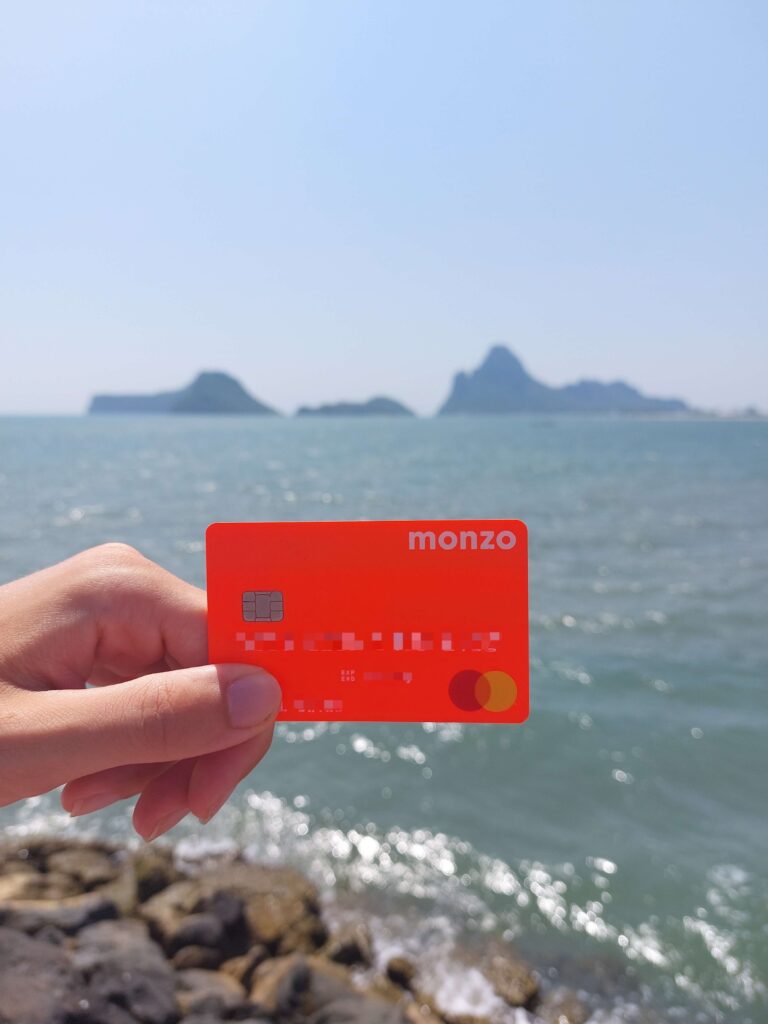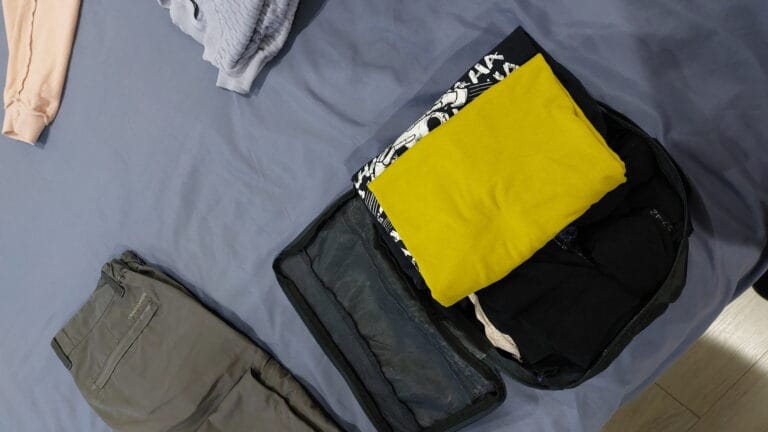Are you seeing everyone travel the world while you are feeling stuck, wondering how to save money to travel as a student?
We are here to help.
In this post, you’ll find useful tips and tricks on how you can save money and be able to travel – even if you are a (poor) student.
So, make your instant noodles in a cup and let’s get to it (side note: once you become an instant noodles kind of a person, you never really stop being one. We still eat them to save money when we travel, and we are long past our student years!).
This post may contain affiliate links. For more information, please read our Disclaimer.

Here’s a little bit about our journey, if you are new here! If you know us, feel free to skip this part.
After leaving our old life in Scotland in March 2022 (it rains too much there), we travelled full-time for almost 2 years. Sounds fancy, doesn’t it? Well, it was. If you think that carrying overpacked backpacks in 45°C heat around streets that aren’t even on Google Maps is fancy. And that’s just 1% of all the fun we had! 😆
During the 2 years we volunteered in Italy and Bulgaria (free travel while learning new skills, anyone?), explored other amazing European countries and backpacked Southeast Asia. Btw, even our secret wedding was more of an expedition than a wedding. 😅
And, of course, we researched and planned everything ourselves, because you gotta keep the budget low, right? If you are like us, you’ve come to the right place, because we want to share all the useful travel tips and info with you!
Excited? Good. Let’s get into it so you can go on your own epic adventures too!
Why you should trust us
Let’s say you don’t know us. This might be the first post from us that you’ve stumbled upon.
In that case, may we suggest you check out our About section to get to know us better?
But, if you can’t be bothered or are short on time, here are two main reasons why you can trust our advice:
- We were poor students once
- Since then, we have collected a lot of travel experience, including travelling full-time for almost 2 years, and now we want to share all our tips and tricks so others – like yourself – can do it too!
Also, while we did travel a bit as students, we wish we had known all the things we do now – wish someone had told us how to travel more as students!
That’s why we want to make sure that we share all we’ve discovered along the way.
Just a little disclaimer: We’re not financial advisors, so take this as friendly info, not professional advice. Make sure to do your own research or chat with a pro before making any money moves!


From poor students to poor full-time travellers. 😆
The one truth you need to know
First of all, there is one main truth you have to understand.
Most students are time-rich and money-poor.
Now, of course, there are exceptions. But if you are reading this post, we are assuming you’re a poor student who wants to travel more and needs some tips on how to make this happen, not an heir to a hotel empire.
So, we are going on the assumption of a time-rich and money-poor scenario.
The good news?
This is actually your superpower.
Your superpower
The sad truth?
There are many people who have the money to travel the world.
But they can’t.
They might have the money because they are working all the time in their demanding jobs.
So even though they can afford to see the world, they are just dreaming about it – same as you.
Or they might be making enough money to travel, but might have an equal amount of responsibilities to pay for – a mortgage, a car, two kids, an old family dog’s visits to the vet etc.
Again, this is a generalisation, but when you are a student, you have time. And you don’t have the demanding job or other things stopping you from travelling. We’ll talk more about this in a bit.
For now, just shift your mindset from:
“I am a poor student who doesn’t have money to travel.”
To:
“I am a time-rich person who will figure out how to save money to travel as a student.”

How to save money to travel as a student
It’s not enough to have a superpower, though.
You actually have to know how to use it.
In this case, you can trade your time for cheaper travel options. Ones you will be able to afford.
Don’t worry, we’ll explain it all.
The most important thing now, once you accept time as your superpower, is to realise that you can use it.
Did you know that when you are 20, you have around two billion seconds of your life left? Sahil Bloom wrote a brilliant post about this – have a read to see how you are also a time billionaire.
Now, let’s talk about how you can spend your billions to travel as a student.
We’ll share 7 ideas that will help you do this.

Idea no. 1: Rethink your wage
First of all, if you can, do get a job.
Even if the pay is rubbish (though obviously, try to get one with as high a wage as possible).
Alternatively, find ways to make money yourself. At the risk of sounding like old people, there are so many more opportunities for this than when we were students.
If you are reading this and thinking: DUH! This is not a very novel advice.
We get it.
But don’t angrily close this post just yet. This is all heading somewhere useful.
So, aside from making money, you need to shift your mindset.
We’ve already talked about you being a time billionaire, but there is another mindset you should adopt.
If your wage sucks, we want you to start thinking about it differently.
Instead of saying:
“My wage is low, so I can’t travel.”
Say:
“My wage is low, but so are my expenses; therefore, I can figure out how to save money to travel as a student.”
We’ve already touched on this earlier, but we wanted to talk about it again because we know what it’s like.
When you are a student, it’s easy to feel like you are too broke to do anything.
But trust us. You don’t know how good you have it.
Again, generalising, but if you have money coming in AND you don’t have any of the big responsibilities (bills, taxes, mortgage, kids’ school tuition, health insurance etc.), you are in a really good position.
Just look at the equation:
Low wage minus small responsibilities = money for travelling
High salary minus big responsibilities = money for travelling
See?
This shows that a high salary doesn’t automatically mean better financial well-being – it all depends on how much is left after you pay for all your responsibilities!
So it might be that someone earning much more than you actually has the same amount of money left over for travel.
It’s definitely something worth thinking about to shift your mindset.
And if you are wondering why having the right mindset when it comes to finances matters, learn about scarcity vs abundance. Here is a post that not only explains the concept but also uses real life examples to illustrate it – if that’s what helps you learn.

Student debt
A little side note for this whole post on student debt, because we know that it’s a no. 1 problem for many graduates.
Our background is from Europe – we both studied in Scotland where, thankfully, student loans and repayments are set up in a decent way, so we were lucky in that aspect.
This is why we are not going to get into this topic – we are not experts on student debt in the USA or any other country.
The couple things we would suggest you do though, if this is your worry:
- We are not saying to completely yolo it, but if student debt is something you will be tackling later, it’s just another reason why you should enjoy the perks now – travel while you are a student, before student loan becomes one of your responsibilities.
- That being said, be prepared for the future. For example, if you know you will have to repay a student debt later on, don’t get yourself into another debt. Stay away from credit card debts, car loans etc., so you don’t enter the “real world” with an anxiety-inducing pile of debts.
- Check out financial bloggers in the country where you are studying. Let’s talk a bit more about this.
We say financial bloggers specifically because:
- If they are bloggers, they are most likely blogging about their own experience of tackling student debt. Beware financial advisors trying to sell you their services on their websites and “blogs”.
- If their area of focus is finances, they will know a thing or two about the best ways to manage student debt, which is exactly what you want.
Bonus tip
If you’re in the process of choosing a college, make sure to consider not just your education but also the financial impact of your decision.
If you’re in the USA, we highly recommend checking out Lauren & Steven from Trip Of A Lifestyle. They retired at 29 (!!) and share invaluable advice about finances, including how Lauren managed to graduate debt-free.
And no, they didn’t use some sketchy “get rich quick” scheme or dubious crypto strategies. Rest assured, we make sure to only recommend good resources – in this case, a smart, financially-savvy couple with real, practical advice – not a bunch of internet hustlers pushing risky investments.
Idea no. 2: Use savings accounts
Let’s for a moment pretend you are not a completely broke student.
Let’s say that you already have some money.
Do you know what to do with it?
Here are the 3 options:
- Spend it
- Have it sitting in a bank account while you are figuring out how to save money to travel as a student
- Make it work for you
Which option do you choose?
Now, we know you are smart, and you pick option no. 3!
What do we mean by making your money work
Don’t worry, this isn’t about investing into some *totally legit* new altcoin that will make you a millionaire in 6 months. LEGIT!!! 💥🔥💰 (you know the kind of “strategies”)
All we are suggesting is that you put your money into as good a savings account as you can while you are in the process of getting money together for your travels.
Tips on savings accounts
- You want to put your money into a savings account, not invest it. Why? Even though investments can have higher returns than savings accounts, the goal here is to have money for travelling, so you need something short-term. Investments, generally speaking, should be held long-term.
- Shop around. Find a savings account with a good interest rate. But don’t commit to anything. More on this in the next point.
- Make sure you can access your money whenever you need it. If there is a notice period of a month to get your savings back, what are you going to do if a cheap flight to Asia suddenly goes on sale?? Your money should be accessible to you at a moment’s notice, even when it’s held in a savings account.
- Pay into the account regularly. This is key. Decide how much you want to put in every month. Either a fixed amount, if your monthly wage is always the same, or a percentage, if it changes month to month. Then, pay into the account first, as soon as you get your wage (providing you have calculated the correct amount, of course, and still have enough to pay your bills and any other life responsibilities!).
- Find a digital, modern bank which lets you manage your money in an easy and more enjoyable way. Maybe they let you rename your savings pots. So instead of “Savings account” it can be called “Croissants in Paris”, because you will be saving in it for a trip to France. Or they let you add a picture to your savings account, so it’s more fun to look at and it motivates you to save more.

Pictured: at blink-182 show in Prague
Savings account to check out
If you are in the US or the UK and are looking for a great, modern digital bank, check out Monzo.
The two amazing things you’ll get?
- A current account with a no-fee debit card and free cash withdrawals abroad (the holy grail of all travellers)
- Access to their Savings Pots
The Savings Pots, of course, come with all the cool features, such as:
- Being able to personalise your Pot
- Rounding up extras – if you spend more than £1, they’ll round up the change to the nearest pound and put it in your Pot
- If you are struggling to control your spending, you can even lock your Pot for a set period of time to keep it safe from yourself!
We love Monzo because of all these awesome features it offers (and their debit card is a quirky coral colour!).
Oh and did we mention that if you sign up using one of our links, you’ll get extra £10?? All you have to do is create an account and make a card payment within 30 days! (We’ll get £10 too, so it’s a win-win for everyone!)

Idea no. 3: Volunteering abroad
One of the best ways to travel for (almost) free?
Volunteering!
We won’t go into it too much here, because we have a detailed guide where you can find out everything you need to know about volunteering.
Why should you consider volunteering, though?
Well, it’s a great way to travel, because you can trade your time for accommodation and food. And we spoke about being time-rich and money-poor, right?
The basic idea is that you work for around 4-5 hours a day for free, but you get accommodation and food in exchange for it.
If you want to know more about how this works or where you can look for volunteering opportunities, make sure to check out our guide.
Bonus tip
If you want to really get amazing value out of your volunteering experience, here are our two secret tips:
- Find a great host that will offer you more than just food and accommodation. But wait, we don’t mean material things here. We mean finding a host who can teach you skills you want to develop. Or one that can share their life experience with you. Or become your friend. You can find tips on finding a great host in our guide.
- Pick a place where you will save a lot of money by volunteering. That means a country or a town where accommodation or food is expensive. For example, we volunteered for 2 months in Italy. Living there would have cost us ££££ for two months, but through volunteering, we got to stay there for almost nothing!
Again, all tips and tricks for having a great volunteering experience are in our guide and our DMs are always open for questions.

Idea no. 4: Study abroad
One of the first things you should do when you start attending a new school?
Okay, there is a long list.
But, if travel is your priority, make sure to do this early:
Find out about study abroad opportunities.
In Europe, students have access to Erasmus+, and, honestly, it’s the best thing ever.
Mirka got to live and study in Barcelona thanks to the programme. What a dream!
So, early on, if you are in the EU, find out more about how to take part in the Erasmus+ programme.
If you are not in the EU, find out whether there are any similar study abroad opportunities.
The one thing most students don’t realise
Actually, two things:
- There are some opportunities in the Erasmus+ programme even for non-EU students. You can find out more about this either via your school/university or on the Erasmus+ website.
- You can take part in many youth programmes even after you complete a study programme like Erasmus+ or even after you stop being a student! Let’s talk more about this.

Youth programmes
We never realised this till it was too late (for us), but there are tons of youth programmes that you can take part in, even if you are no longer a student, provided you are of a certain age.
These initiatives bring young people together to focus on topics like sustainability, leadership, cultural exchange, and social impact.
That means you can either:
- Still travel for pretty much free, even after your golden student years are over (aka extending the good life and avoiding the trap that is adulthood).
- Travel extra while you are a student – perhaps during your school holidays – without having to rely just on the one study abroad programme your school might be offering.
Btw, if you are enjoying this post, we’ve got another one that might help you – it’s about how you can travel for FREE as a student. Everyone loves free stuff, right? So make sure you check it out!
Some programmes to check out
If you are wondering how you can find out about these youth programmes, we would suggest the following:
- Stay informed about any opportunities promoted by your school/university (even if not run by them)
- Check out official websites or social media channels of your town or country/state – they often promote youth programmes
- Ask ChatGPT for any programmes that might be suitable for you (make sure to describe your situation first, so the chatbot can give you suitable recommendations)
Some programmes that we are aware of that you might wanna check out (or find similar alternatives):
- European Solidarity Corps, which let you volunteer on projects in the fields of education, environment and natural protection, migration, humanitarian aid, and many others
- United Nations Youth Volunteer Programme, where you can, for example, help with disaster response or development projects
- 4-H International Exchange Programme in the US, which offers international exchange opportunities even to very young students
A note on youth programmes and study abroad
We are not suggesting you treat any of these programmes as free travel.
Because, while they do let you see the world, usually without having to spend much, their purpose is more than that.
Use them to learn new things. Broaden your horizons. Make new connections. Explore other ways of living.
And find ways how you can give back – either through the programme itself (e.g. the ones focusing on finding ways to make living more sustainable) or by helping other students do the same. If you can, volunteer to promote the study abroad and youth programmes to other students once you have completed them. Spread the word online. Tell your friends. Or write a blog post about it, like we are doing!

(also because that was back when Mirka was 21, her back did not hurt and staying up all night was not a problem. Good old times!)
Idea no. 5: Free stuff!
So many things are free for students – the world knows you are all poor! 😆
Your job is to find all the freebies and make use of them.
It’s one of the best ways how to save money to travel as a student.
Here are some things you might want to consider:
Did you know that there are cities around the world where you can go to museums and other sights for FREE? Even in places like Paris?? Yup, if you are younger than 26, you can visit all these museums for free – in freaking Paris!
UK is also fantastic for free museums and galleries – so many places don’t charge and the museums are next level too. If you ever go to Edinburgh, for example, make sure to visit the National Museum of Scotland to find out whether you weigh as much as a koala or a chimpanzee or perhaps an anteater! (there are so many interactive exhibits there!)

Discounts
Some things might not be free, but they are heavily discounted for students.
As with free stuff, make sure to hunt down these bargains and use them.
Always check for a student price wherever you go.
Oh, and if you can, make sure to get an ISIC and use it. That should be step no. 1 in your journey of figuring out how to save money to travel as a student, but it’s such an automatic part of a student life that we don’t think it even needs to be covered in this post.
So, here are some extra ideas to check out:
Note: These come from countries we are familiar with, but it doesn’t mean your country won’t have an equivalent. Use these as ideas – for example, if the UK has a discounted railcard, check if your country does too.
- In the UK, you can get the 16-25 railcard and travel on trains cheaper
- National Trust has a young person membership – giving you free entry to more than 500 sites the Trust looks after! (including castles, gardens or historic houses)
- Remember to also shop like a student – with cards like Unidays, you can get discounts at many popular brands like Apple or ASOS
- Do we even have to mention the famous Interrail? If you are aged 27 or under, you can get it cheaper by buying the Youth Pass! Remember, if you are a non-European resident, you can get the same pass, just called Eurrail!

Idea no. 6: Cheap living
There are always ways you can reduce your expenses. Yes, you might have to get creative to make it work. But there are also many easy ways to live cheaply – we wrote about the 7 things we did to save money for full-time travel, and they are all simple changes!
If you need more help, there are countless blogs about living on a low budget out there, so find people you resonate with and read through their advice too.
Remember, every dollar/pound/euro/any other currency you save means you can travel just a bit more. Just a bit longer.
The 4 steps to reducing your expenses
- First, start tracking your monthly expenses. You can use a fancy app for this, or you can stick to a simple Google Sheet. The main thing? Don’t go spending money on an app that is meant to track your money! That’s just crazy stuff.
- After the first month, evaluate your spending. Can you see any obvious ways to cut your expenses down?
- Once you’ve identified the obvious expense offenders, it’s time to get creative. Use your own head, or check out other people’s tips on how you can save money for travel.
- Keep tracking your monthly expenses, but also make sure to track your travel savings so you can see that the process is worth the effort!

Idea no. 7: Budgeting for travel
We’ve got one last tip for you, to be able to travel more.
Budgeting.
It’s the secret of most full-time (or long-term) travellers.
Basically, the goal is to make your money (income or savings) stretch as much as possible.
There are different ways to do this; for example, you can travel to countries where your money goes further, or you can decrease your travel standards (e.g. stay in hostels instead of hotels).
One of the most popular ways? Trading time for money. We covered this at the start of this post.
How does this work when you travel?
Trading time for money when travelling
Well, you can, for example, take a 10-hour bus instead of a 2-hour flight.
If the bus cost you £20 but the flight would have cost you £220, you have traded 8 hours of your time for £200.
This is how most long-term travellers are able to stay on the road for so long.
And remember, you are a time billionaire.
Bonus tip
Use the time you traded to make you more money. While on the 10-hour bus? Prepare posts for your social media channels that can make you money. Make connections with other travellers – they might be able to help you save money (e.g. by sharing a taxi with them). Write a blog post so you can monetise your blog. Or even read a book about investing so your money can start making you more money!
Note: Trading in time for money when it comes to travel is not good just for you, but also for the planet. If you want to travel more sustainably, choose overlanding instead of flying.
Again, we won’t go into much more detail about this here, otherwise, this post would be longer than Santa’s naughty or nice list! But we do have this post which will tell you exactly how much money you should save to travel – including tips and tricks, as always!
So have a look there if you are unsure how to create a good budget for your travels.

The one thing that stayed the same? Travel is always a priority
We hope this post helped you find ways how to save money to travel as a student (despite feeling like all you can afford in your life are instant noodles and virtual travel on YouTube).
The main thing to remember: it’s possible if you want it enough (enough here means as much as you want sleep during the exam period. You need to want it that much).
If you have any questions, don’t hesitate to ask in the comments or, if you want to chat more privately, DM us on our Instagram.

Hi!
We’re Mirka & Daniel — full-time travellers, professional overthinkers & bad luck magnets. We research EVERYTHING and then share all the weird travel tips with you here. Follow along to make your adventures easier! 🌴





